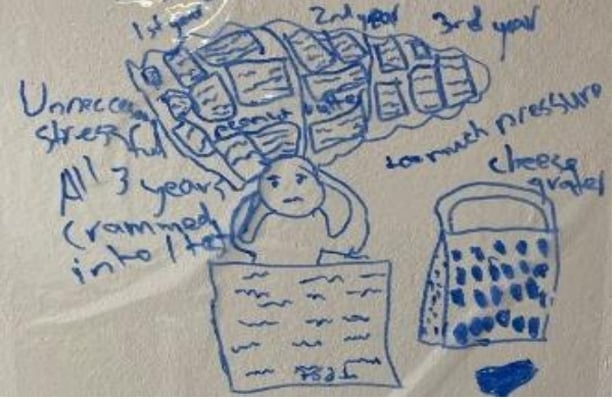Junior Cycle students are experiencing "significant stress" caused by school workloads and many are struggling to balance homework, Classroom Based Assessments (CBA) and study for tests and exams, research carried out at the University of Limerick has found.
Students who took part in focus groups with researchers singled out CBAs as a central cause of strain.
The study found that the projects were inducing "a sense of futility and frustration" in students, and the clustering of CBA deadlines was compounding stress levels.
Researchers examining how the new Framework for Junior Cycle is working out surveyed more than 1,800 Junior Cycle students across 100 schools.
213 young teens also took part in focus groups.
Teachers, principals, and parents have also been surveyed or consulted as part of the ongoing research.
The new Junior Cycle programme has been in place for between two and nine years, depending on the subject.
Junior Cycle students complete one CBA in every subject in second year, and again in third year.
While students receive marks for these projects, those marks do not count towards their Junior Cycle results.
"Overall, whilst students articulated positive aspects to the CBAs, the negatives dominated conversations in most focus group discussions," the study says.
Students were in favour of the concept of continuous assessment, but they believed that CBAs "did not deliver many of the benefits that continuous assessment promises".
The study found that because students see CBAs as largely disconnected from their Junior Cycle exams, this induces "a sense of futility and frustration for them", with students regarding CBA work as "extra".
Students told researchers they felt the work they did for CBAs should contribute more substantially to their overall Junior Cycle grade.
"You do so much work for them and they count for nothing," one student told researchers.
The study has found that the scheduling of CBAs was also causing problems for students.
"This scheduling difficulty was a dominant theme in conversations about CBAs and many described this element as a particularly stressful process."
The research was commissioned by the National Council for Curriculum and Assessment. The interim report published this week is the second of a series.
CBAs are not the only source of stress for students. Teens across the 100 schools surveyed complained about being "overwhelmed" by the need to memorise large amounts of information.

Homework also emerged as a dominant theme in focus group discussions with students critical of the volume of work they were receiving.
"This was seen to contribute to a sense of content overload," the report found.
Homework emerged in discussions with students as "a significant source of negativity and stress".
In terms of teaching and learning, students told researchers that they favoured "engaged, collaborative, creative, and active learning experiences which offered a balance between individual and group work.
"They valued choice in their learning... They disliked didactic approaches, and most were averse to the practice of notetaking and methods of learning that were passive and teacher-centred."
But despite this, "across the large majority of case study schools, students reported that listening, notetaking and memorisation typifies their engagement at this academic level".
The students were highly critical of exams, which they felt did not allow them to perform to the best of their abilities.
"There's not enough time or there's too many questions in the test and nobody's getting it done. So no one's actually showing what they know," one student was quoted as saying.
The report is peppered with quotes from students.
One told researchers, "I don't like tests, because, some people are more practically smart... They're better off doing stuff instead of just writing and writing and writing and memorising."
The study found that from first year there appeared to be a strong focus on exams, with academic pressure felt by students across all of the 100 schools that participated in the research.
Characterising this pressure one student told researchers: "The way they speak about exams, the way they put the pressure on you... you'd swear it was the end of the world if you don't pass anything. They've been doing that since like, first year and we were 12."
Wellness is a central part of the new Framework for Junior Cycle, but students have complained that heavy workloads mean they do not have time to lead a balanced life.
One student told researchers: "I think it's hard for time management, to balance everything when we're getting like piles and piles of homework, but also being expected to do like two or three hours of study per night, but then they're also saying it's important for our wellbeing to get out and go outside and play football or whatever. It's very hard to get it all in."
The impact of the pandemic on these young teens is noted regularly across many parts of this interim report.
It finds that the pandemic restricted opportunities for innovative practices and hampered teachers' engagement with the curriculum changes in schools.
"According to almost all parents, the Covid pandemic had a significant impact on their child's education," it states.
"It was believed that this impacted on their transition to post-primary school, their levels of motivation, their social development, mental health and impeded their learning."
This longitudinal examination of the new Framework for Junior Cycle is continuing.
This second interim report has concluded that the Junior Cycle needs "untangling" from a wider culture of examination and assessment, and it says that this "remains a challenge".







